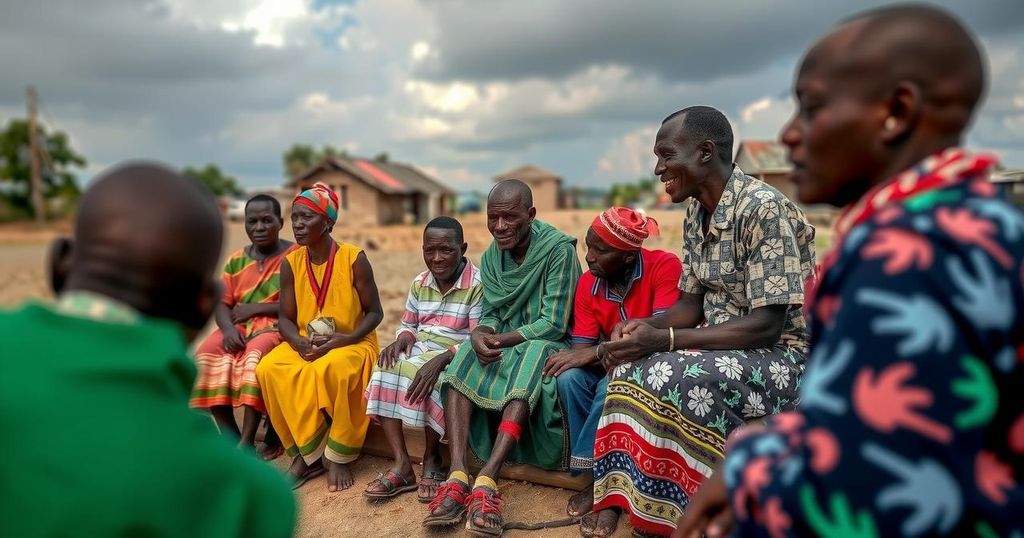Abyei Community Advocates for Self-Rule as Sudan Conflict Delays Referendum
Leaders of the Dinka Ngok in Abyei demand self-rule amidst the ongoing Sudan conflict, which has stalled a long-promised referendum on the region’s future. In a memorandum to UN peacekeepers, they seek international support for self-governance during interim negotiations between Sudan and South Sudan, citing their rights as outlined in the 2005 Comprehensive Peace Agreement.
On October 28, 2024, leaders of the Dinka Ngok community in Abyei have voiced a strong demand for self-governance amid the prolonged conflict in Sudan, which has obstructed plans for a referendum that would clarify the region’s future. In a formal memorandum submitted to the United Nations Interim Security Force for Abyei (UNISFA), these leaders have urged for international assistance to achieve self-rule during a transitional period, pending an eventual agreement between Sudan and South Sudan regarding the status of Abyei. The 2005 Comprehensive Peace Agreement awarded Abyei a unique status and promised a referendum to determine whether it would be incorporated into Sudan or South Sudan. However, this vote has faced numerous delays, primarily due to disputes over voter eligibility concerning the nomadic Misseriya tribe. The memorandum elaborated, “It became increasingly clear that Sudan is resisting the loss of Abyei, and that South Sudan… lacks the capacity or the will to go to war with Sudan over Abyei.” As the situation in Sudan deteriorates further and South Sudan remains reluctant to pursue unilateral action, the Dinka Ngok perceive a diminishing possibility for a peaceful resolution in the imminent future. They caution that Abyei, which has already suffered significantly from years of violence, is in danger of transforming into a conflict zone. Moreover, the memorandum underscores the dire plight of statelessness affecting the Abyei population, who currently lack the backing and resources of a recognized nation-state. It cites their entitlement to self-governance as delineated in the 2005 peace agreement, which initially permitted residents of Abyei to hold dual nationality in both Sudan and South Sudan. However, in the wake of South Sudan’s secession and subsequent administrative modifications, this dual citizenship provision has effectively lapsed. Consequently, the leadership of the Dinka Ngok is now advocating for the acknowledgment of their right to self-governance and restoration of dual citizenship to alleviate the current impasse and foster harmonious relations with both sovereign states.
The demand for self-rule in Abyei arises within a complex historical and political context between Sudan and South Sudan. The region of Abyei is claimed by both nations and, as stipulated in the 2005 Comprehensive Peace Agreement, was to have a referendum to decide its ultimate allegiance. Since the agreement, various political and tribal disputes, particularly concerning the participation of the Misseriya tribe in the vote, have hindered the referendum process. As a result, the Dinka Ngok community, the predominant local population, is advocating for immediate self-governance to safeguard their rights and the future of the Abyei region amidst ongoing instability in Sudan and the reluctance of South Sudan to act decisively.
In conclusion, the leaders of Abyei’s Dinka Ngok are demanding urgent recognition of their right to self-governance as the conflict in Sudan delays a crucial referendum concerning the region’s fate. This plea for self-rule, intertwined with the historical context of the 2005 Comprehensive Peace Agreement, reflects a desire to secure a stable future for a community that remains vulnerable amid violent upheaval. By seeking international support, the Dinka Ngok aim to navigate the complexities of their status and maintain peaceful coexistence with both Sudan and South Sudan.
Original Source: sudantribune.com




Post Comment